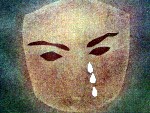By Verna St. Rose Greaves
August 18, 2008
I tasted my blood
At birth
So that I
May not know war:
Ocean of blood show me where you flow
River of bile tell me of your source
I bit my tongue
Before I slept
So that I
Could talk back at death:
Hills of flesh let me know your root
Mountain of bones mould me into ivoryFemi Fatoba – Petals of Thought
 July 19th 2008, I sit in the International Convention Centre in KwaZulu-Natal, South Africa. I listen intently to the keynote speaker ten year old, university student Anfani Okosun. He speaks to issues of human rights and social justice, about putting an end to human suffering, and preserving the dignity of the person. He challenges us to remember those who perished under bad regimes and the impunity afforded their victimizers. He is scandalized by the usurping of the world’s resources by a few and implores us to work towards the dismantling of oppressive systems and structures. The positive traditions in our histories he says must be used to battle against the enormous challenges we face.
July 19th 2008, I sit in the International Convention Centre in KwaZulu-Natal, South Africa. I listen intently to the keynote speaker ten year old, university student Anfani Okosun. He speaks to issues of human rights and social justice, about putting an end to human suffering, and preserving the dignity of the person. He challenges us to remember those who perished under bad regimes and the impunity afforded their victimizers. He is scandalized by the usurping of the world’s resources by a few and implores us to work towards the dismantling of oppressive systems and structures. The positive traditions in our histories he says must be used to battle against the enormous challenges we face.
Is it mere coincidence or providence that I am sitting in this multimillion dollar facility in recent post-apartheid South Africa celebrating Mandela’s 90th birthday; mere days before the commemoration of one hundred and seventy years of emancipation from chattel slavery? It is a few days short of the anniversary of the 1990 coup in Trinidad and Tobago. July is the month in which many world revolutions took place.
Powerful messages are brought through this child and his two stage companions boys who live on the streets of South Africa. One introduces him, the other responds to his offering. Neither appears intimidated by the audience. They tell of the hunger and hurt of life on the streets, of public invisibility, brutality and sexual abuse at the hands of the police. They grieve their few possessions and speak of their clothes being taken away as if their very skin was being removed. In the moment their confidence rejects victimhood, celebrates their survival. They speak not only their pain but of their power. I receive the messages they bring and I am humbled.
I am one of one thousand social workers present. How will this impact on our lives and practice? How can we use it to refashion our work, our relationships, and our institutions? The ongoing clapping seems patronizing, the standing ovation though premature well deserved.
I think of Trinidad and Tobago and how desperately in need we are of an enriched public discourse — one which will challenge old assumptions and processes, spawn new methodologies which will reflect our truths, our best thinking and ideas.
I think of the many children we have lost to silence, our voices constricted by fear, our limbs immobilized. I see colleagues every day intimidated and consumed by what “can’t be done”; overwhelmed by the concept that people are the best architects of their own lives; fearful of the awesome nature of people power.
I think about the frailty of the responses to and the lack of interest in an effective Children’s Authority. The children who go to bed empty in the midst of our wealth. I conjure up the boy child who took his own life in the precincts of the court rather than return to the YTC. “No we cyah rest, We cyah rest, we cyah rest,” I sing to him. The Remand Yard where our sons languish while a woman charged with cocaine trafficking is discharged, virtually set free perceivably based on privilege in a justice system where a magistrate ordered a child to be flogged in the court because he was made to sell marijuana in order to survive.
I think of Patrick a scared little boy and the type of leader he may yet turn out to be. I infuse him with the spirit of the three child messengers; their wisdom, their confidence and their humanity.
In my birth waters
Let my inheritance be…
When the world desert me
Let me be a crowd
When I walk alone
